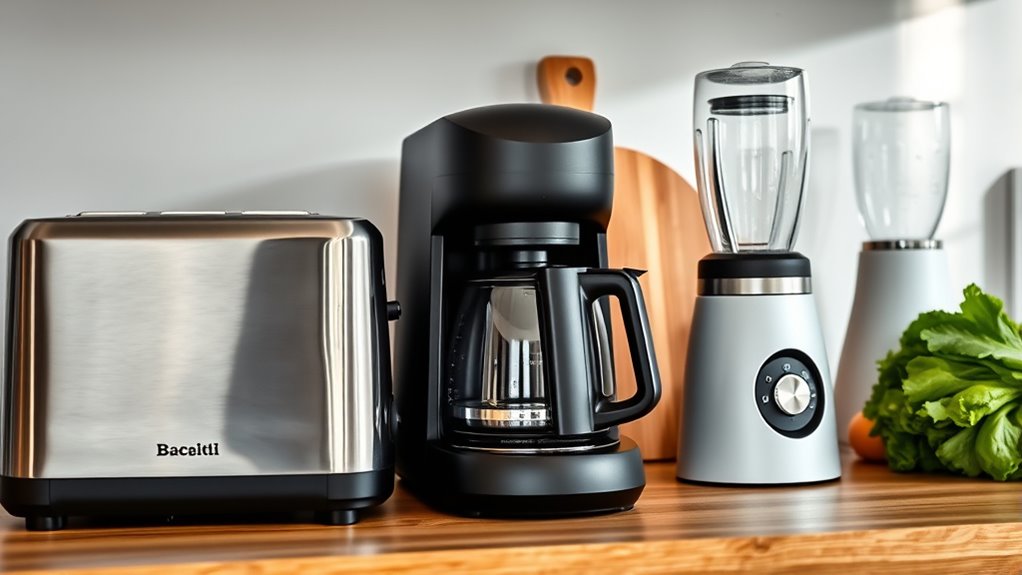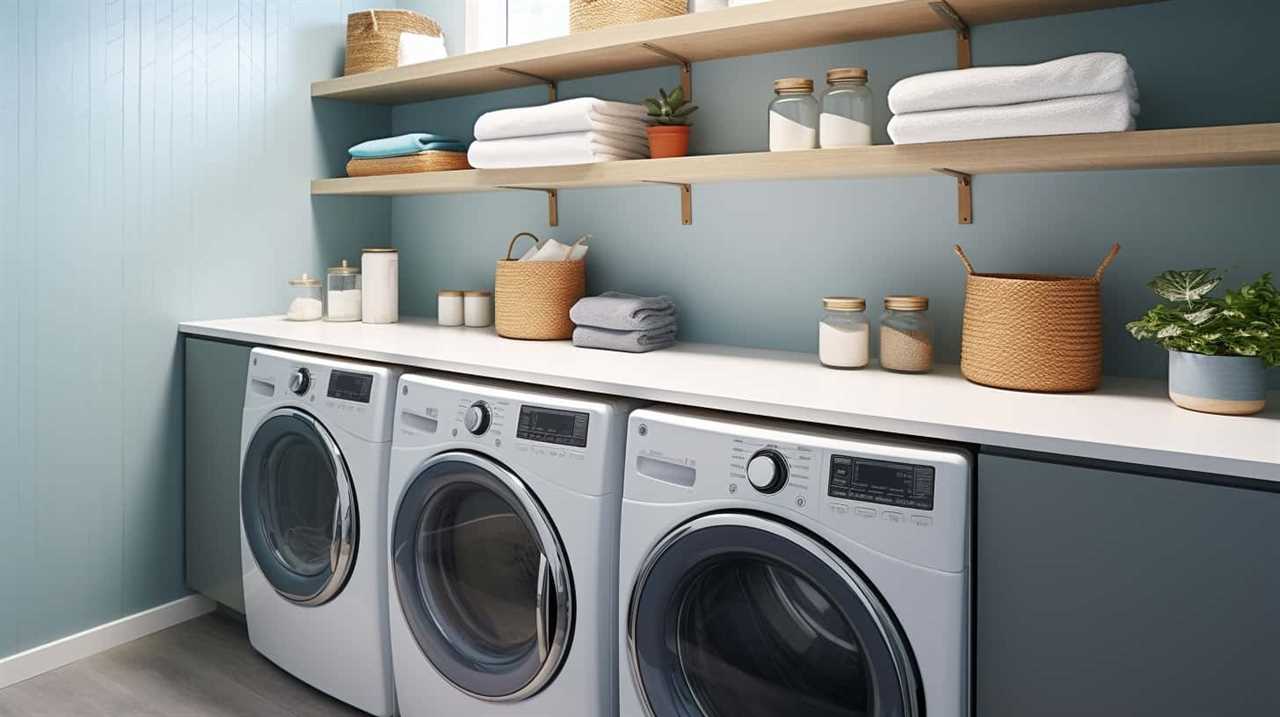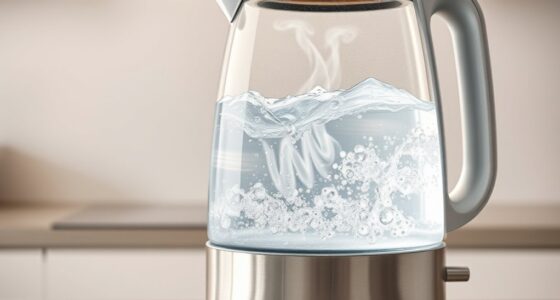A lifecycle analysis of common kitchen appliances shows that their environmental impact starts with resource extraction and manufacturing, which consume energy and cause habitat loss. During use, energy-efficient operation and regular maintenance can cut your costs and carbon footprint. Proper disposal and recycling prevent pollution and conserve resources. By choosing high-quality models and maintaining them well, you can reduce their overall impact. If you keep exploring, you’ll discover ways to minimize environmental effects at every stage.
Key Takeaways
- Manufacturing impacts include resource extraction, energy use, and emissions, influencing the appliance’s initial environmental footprint.
- Energy consumption during use can be optimized through maintenance, efficiency upgrades, and energy-saving features.
- Regular maintenance and timely repairs extend appliance lifespan and improve overall operational efficiency.
- Proper end-of-life disposal and recycling reduce environmental hazards from hazardous materials and conserve resources.
- Choosing energy-efficient appliances and practicing responsible lifecycle management minimizes the overall environmental impact.
Material Extraction and Manufacturing Processes
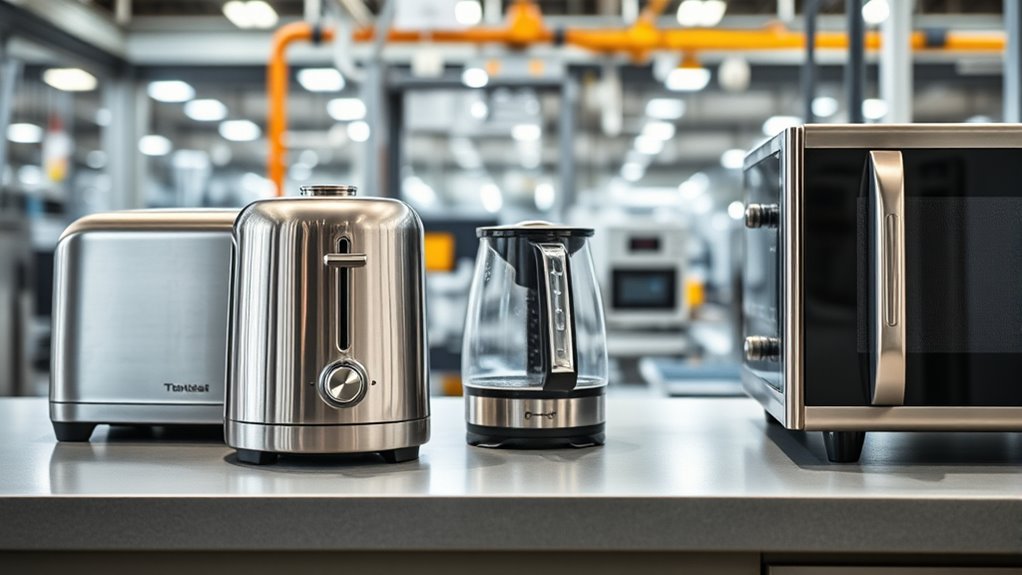
Material extraction and manufacturing processes are the foundations of any kitchen appliance’s lifecycle. When you consider a blender or oven, you’re relying on raw materials like metals, plastics, and glass. Extracting these resources often involves mining, which can cause significant environmental disruption. Once obtained, these materials must be refined and processed, consuming energy and generating waste. Manufacturing then transforms raw components into functional appliances, which involves assembly lines, tooling, and quality checks. Throughout this stage, energy use and emissions can be substantial, especially if factories rely on fossil fuels. Your appliance’s durability and quality depend heavily on these initial steps. By understanding the extraction and manufacturing processes, you’re better equipped to appreciate the environmental footprint of your kitchen appliances from the very start.
Energy Consumption During Use
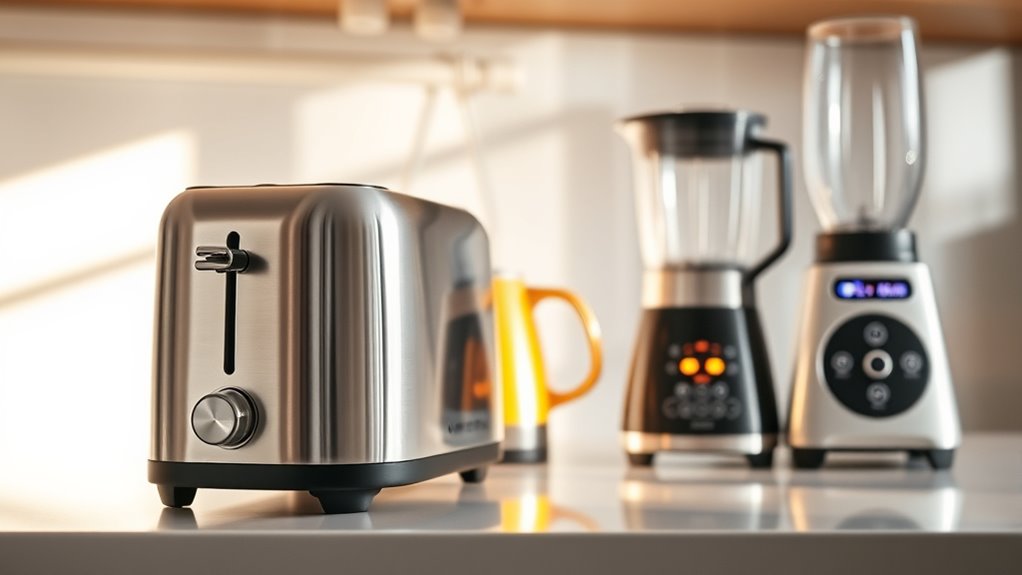
When you use a kitchen appliance, its energy consumption directly impacts both your electricity bill and the environment. Appliances like refrigerators, ovens, and microwaves draw power during operation, with usage patterns influencing overall energy use. For example, running your refrigerator constantly keeps it functioning efficiently, but overloading it or setting the temperature too low can waste energy. Using appliances at peak times or for longer than necessary also increases consumption. Modern appliances often include energy-saving features, but their effectiveness depends on how you operate them. Being mindful of your usage habits can considerably reduce energy consumption. Simple actions like avoiding opening the oven frequently or unplugging devices when not in use help lower electricity use and lessen your environmental impact. Additionally, choosing energy-efficient appliances can further optimize your energy consumption, especially when selecting models with better energy ratings that consume less power for the same performance. Incorporating smart technology into your appliances can also help monitor and improve their efficiency over time. Furthermore, understanding the operation of your appliances, such as how they work during use, allows for more informed and energy-conscious decisions.
Maintenance, Repairs, and Upgrades
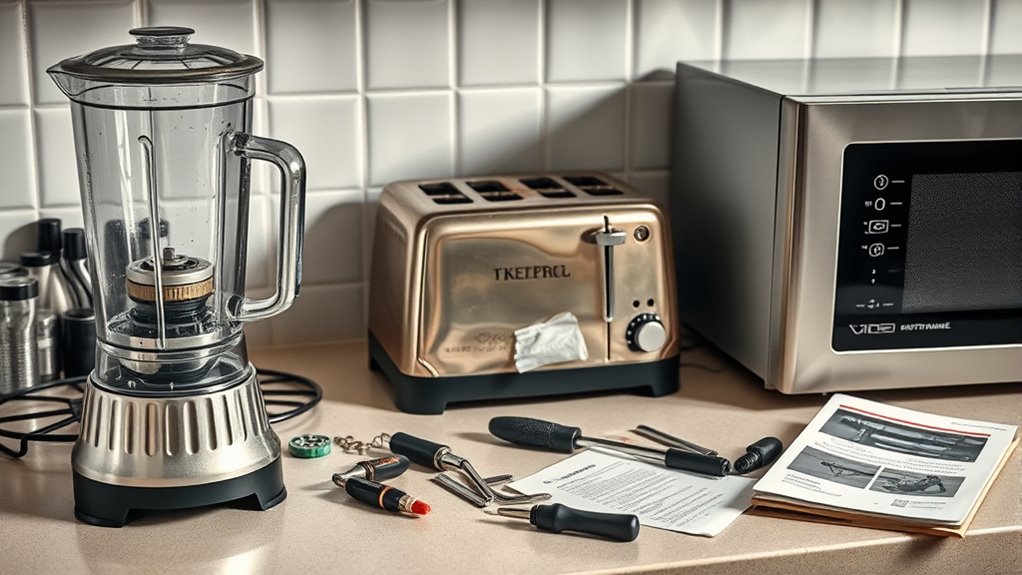
Maintaining your kitchen appliances regularly can extend their lifespan and keep them running efficiently. You’ll want to watch out for common repair issues like faulty motors or leaks, which can often be fixed with simple troubleshooting. Incorporating essential oils for appliance maintenance into your routine can help prevent buildup and promote optimal operation. Additionally, using fabric decorating markers to label or personalize appliance components can assist in organization and identification. Upgrading older models not only improves performance but also reduces energy consumption, saving you money in the long run. Incorporating vibrational energy techniques into your maintenance routine can help ensure your appliances operate smoothly and align with optimal functioning. Exploring Mazda tuning concepts can provide insights into how precise adjustments enhance overall efficiency and longevity. Moreover, paying attention to dog quotes for reflection and humor can offer a lighthearted perspective on caring for your household and pets, reminding us of the importance of harmony in our daily routines.
Routine Maintenance Tips
Regular maintenance is essential to keep your kitchen appliances running efficiently and extend their lifespan. Start by cleaning appliances regularly—wiping down surfaces, removing debris, and checking filters. For appliances like refrigerators, defrost when needed and keep vents clear to ensure proper airflow. For dishwashers, run cleaning cycles with vinegar or dishwasher cleaner monthly to prevent buildup. Ovens and stovetops benefit from deep cleaning to avoid residue that hampers performance. Keep an eye on seals and gaskets; replace them if they show signs of wear to prevent leaks. Use appliances according to manufacturer instructions to avoid unnecessary strain. Regularly inspecting cords and plugs can prevent electrical issues. Proper appliance maintenance not only enhances performance but also reduces the risk of costly repairs over time. Additionally, staying aware of the lifecycle analysis of appliances can help you plan for upgrades and replacements, ensuring your kitchen remains efficient. Understanding the Hyundai Tuning principles can also inspire modifications that improve appliance performance and longevity. For example, preventive maintenance allows you to identify minor issues before they escalate into major problems. Conducting routine inspections can help catch minor problems early and keeps everything functioning smoothly.
Common Repair Issues
Many common repair issues in kitchen appliances arise from wear and tear, improper use, or lack of maintenance. For example, a dishwasher’s spray arms can clog, reducing cleaning power, or a refrigerator’s door seal may weaken, leading to energy waste. Small issues like faulty thermostats, burnt-out light bulbs, or clogged filters are frequent and often simple to fix. Overloading a washing machine can cause motor strain, while neglecting regular cleaning can lead to mold or odor buildup. Electrical problems, such as faulty wiring or blown fuses, also occur. Addressing these issues early prevents costly repairs and extends appliance lifespan. Regular inspection and prompt repairs keep your appliances running smoothly, ensuring you get the most out of your investment. Incorporating sound healing science principles through regular appliance maintenance can also promote a more harmonious and efficient kitchen environment. Additionally, understanding security zone info can help homeowners protect their appliances from theft or damage. Being aware of common appliance malfunctions can help in diagnosing issues before they become severe, saving time and money. Proper filter maintenance is essential to sustain the longevity and efficiency of appliances like air purifiers and refrigerators, reducing the risk of breakdowns.
Upgrading for Efficiency
Upgrading your kitchen appliances for better efficiency involves more than just swapping out old models; it requires strategic maintenance, timely repairs, and thoughtful enhancements. Regular upkeep ensures appliances operate at peak performance, reducing energy waste. Repairing issues promptly prevents minor problems from escalating and prolongs lifespan. Upgrades, like installing energy-efficient parts or features, can considerably cut energy consumption. Consider this table to guide your efforts:
| Action | Benefit | Example |
|---|---|---|
| Maintenance | Keeps appliances running smoothly | Cleaning coils, checking seals |
| Repairs | Prevents breakdowns | Replacing worn-out parts |
| Upgrades | Improves efficiency | Installing smart controllers |
| Monitoring | Tracks performance | Using energy meters |
End-of-Life Disposal and Recycling
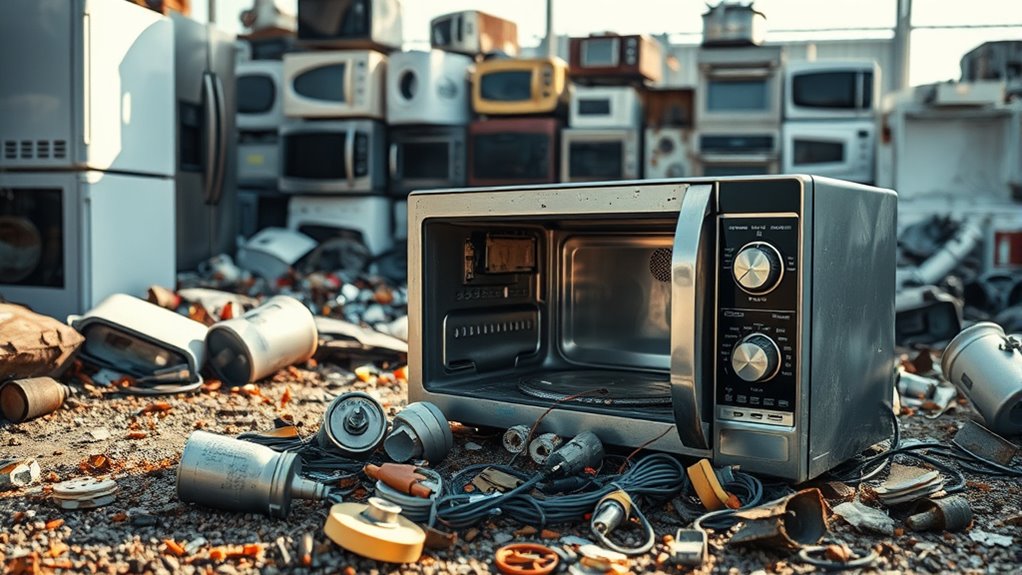
How you dispose of your kitchen appliances at the end of their lifecycle can considerably impact the environment. Proper disposal and recycling help reduce waste and conserve resources. When you’re ready to get rid of appliances, consider these options:
- Recycling centers: Drop off appliances at designated facilities that safely break down and reuse parts.
- Manufacturer take-back programs: Some brands offer recycling programs, allowing you to return old appliances for proper disposal.
- Donation: If appliances still work, donate them to charities or community organizations.
- Bulk waste collection: Schedule pickup with local waste services for large appliances that can’t be recycled easily.
Choosing responsible disposal methods minimizes environmental harm and supports resource recovery.
Environmental Impacts of Production and Disposal
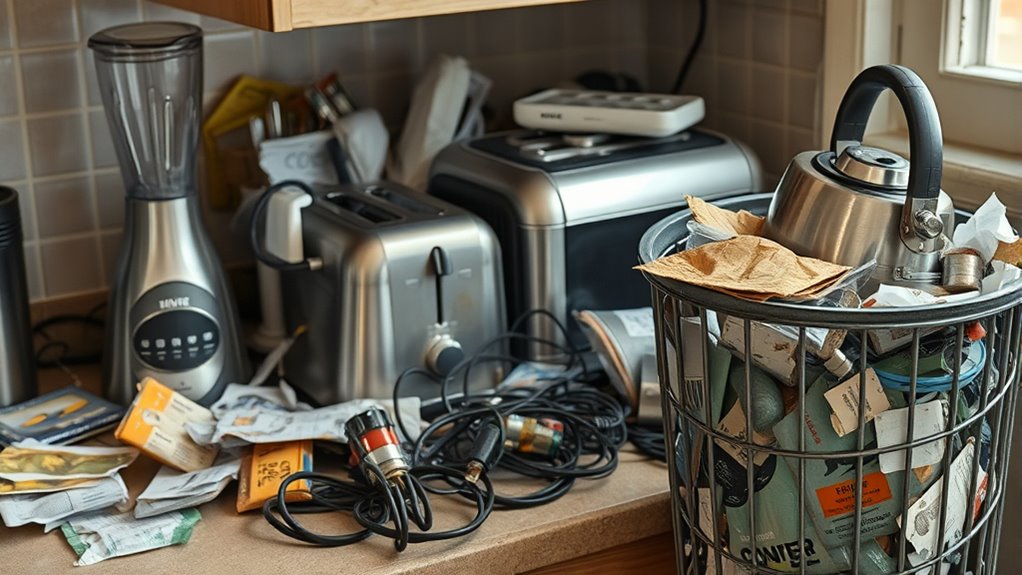
The production and disposal of kitchen appliances have considerable environmental impacts that often go unnoticed. Manufacturing requires raw materials like metals, plastics, and rare earth elements, which involve mining and refining processes that consume energy and generate pollution. These activities contribute to greenhouse gas emissions and habitat destruction. Additionally, the energy-intensive manufacturing process results in a sizable carbon footprint. Disposal presents further challenges: appliances often contain hazardous substances such as chemicals and heavy metals that can leach into soil and water if not properly managed. Landfilling appliances takes up space and wastes valuable materials that could be recycled. Overall, both production and disposal stages profoundly impact the environment, emphasizing the importance of considering these factors when evaluating a kitchen appliance’s lifecycle.
Strategies for Reducing Lifecycle Environmental Footprint
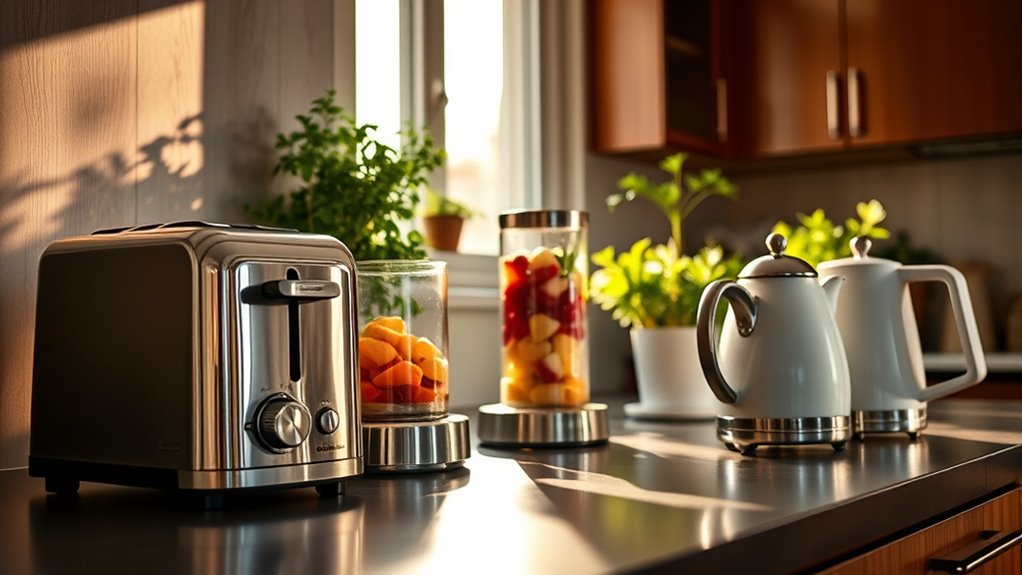
Reducing the environmental footprint of kitchen appliances involves adopting strategies that address both their manufacturing and disposal impacts. First, choose appliances with high energy efficiency ratings—look for ENERGY STAR labels to reduce energy consumption. Second, opt for durable, repairable appliances to extend their lifespan, delaying the need for replacements. Third, practice proper disposal by recycling or donating appliances instead of discarding them in landfills. Fourth, consider buying secondhand or refurbished models to lower demand for new production. Additionally, maintaining appliances regularly can improve performance and longevity. By making conscious choices, you minimize resource use, reduce waste, and lower your overall environmental impact throughout the appliance’s lifecycle. These strategies empower you to contribute to a more sustainable kitchen.
Frequently Asked Questions
How Do Different Brands Compare in Environmental Sustainability?
You’re curious about how brands differ in environmental sustainability. To find out, compare their materials, energy efficiency, and manufacturing practices. Look for brands that prioritize eco-friendly resources, low energy consumption, and waste reduction. Check certifications like Energy Star or Ecolabels. By researching these factors, you’ll get a clearer picture of which brands are more committed to sustainability, helping you make environmentally responsible choices for your kitchen.
What Are the Health Implications of Material Emissions?
Oh, the glamorous world of material emissions—because who doesn’t love breathing in tiny particles every time they cook? When appliances emit chemicals, you might notice respiratory issues, allergies, or skin irritations over time. These emissions can also contribute to long-term health risks like asthma or even more serious respiratory diseases. So, next time you pick a kitchen gadget, remember: what’s inside matters, and your lungs will thank you for choosing wisely.
How Does Appliance Lifespan Vary by Usage Patterns?
Your appliance lifespan depends heavily on how you use it. Frequent, heavy use can wear out parts faster, shortening its life. Conversely, gentle handling and regular maintenance extend its longevity. For example, running a dishwasher daily might lead to earlier breakdowns than using it sparingly. By adjusting your usage habits, you can maximize your appliance’s lifespan, saving you money and reducing environmental impact over time.
Are There Eco-Friendly Alternatives to Traditional Appliances?
You’re wondering if eco-friendly alternatives to traditional appliances exist. Yes, they do! You can choose energy-efficient models with high Energy Star ratings, which use less power and reduce environmental impact. Look for appliances made from sustainable or recycled materials. Additionally, consider manual or non-electric options for certain tasks. By making these choices, you lower your carbon footprint and support a healthier planet while still meeting your kitchen needs.
What Policies Influence Appliance Lifecycle Environmental Standards?
Imagine a world where your choices shape the environment—policies like energy efficiency standards, such as ENERGY STAR, directly influence appliance lifecycles. Regulations set by governments and international bodies push manufacturers toward sustainable designs, while waste management laws guarantee proper disposal. These policies act as the compass guiding eco-friendly innovation, making sure appliances are built to last, recycled responsibly, and reduce environmental impact—empowering you to make greener choices every day.
Conclusion
So, next time you marvel at your shiny new blender, remember its secret life story—full of resource extraction, energy drain, and disposal dilemmas. While it’s tempting to think you’re just enjoying a quick smoothie, you’re actually part of a grand eco-drama. Perhaps it’s time to contemplate whether your kitchen gadgets deserve a standing ovation or a slow, environmentally friendly exit. After all, who knew saving the planet could be so deliciously inconvenient?
